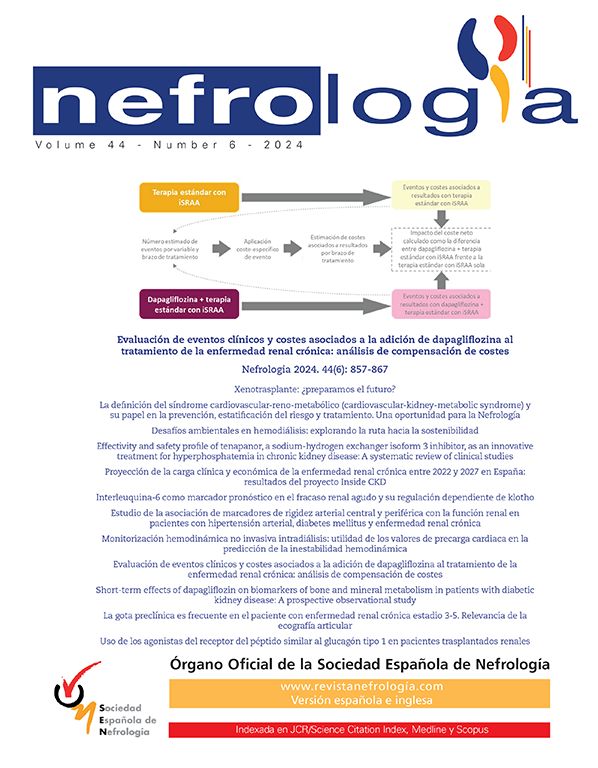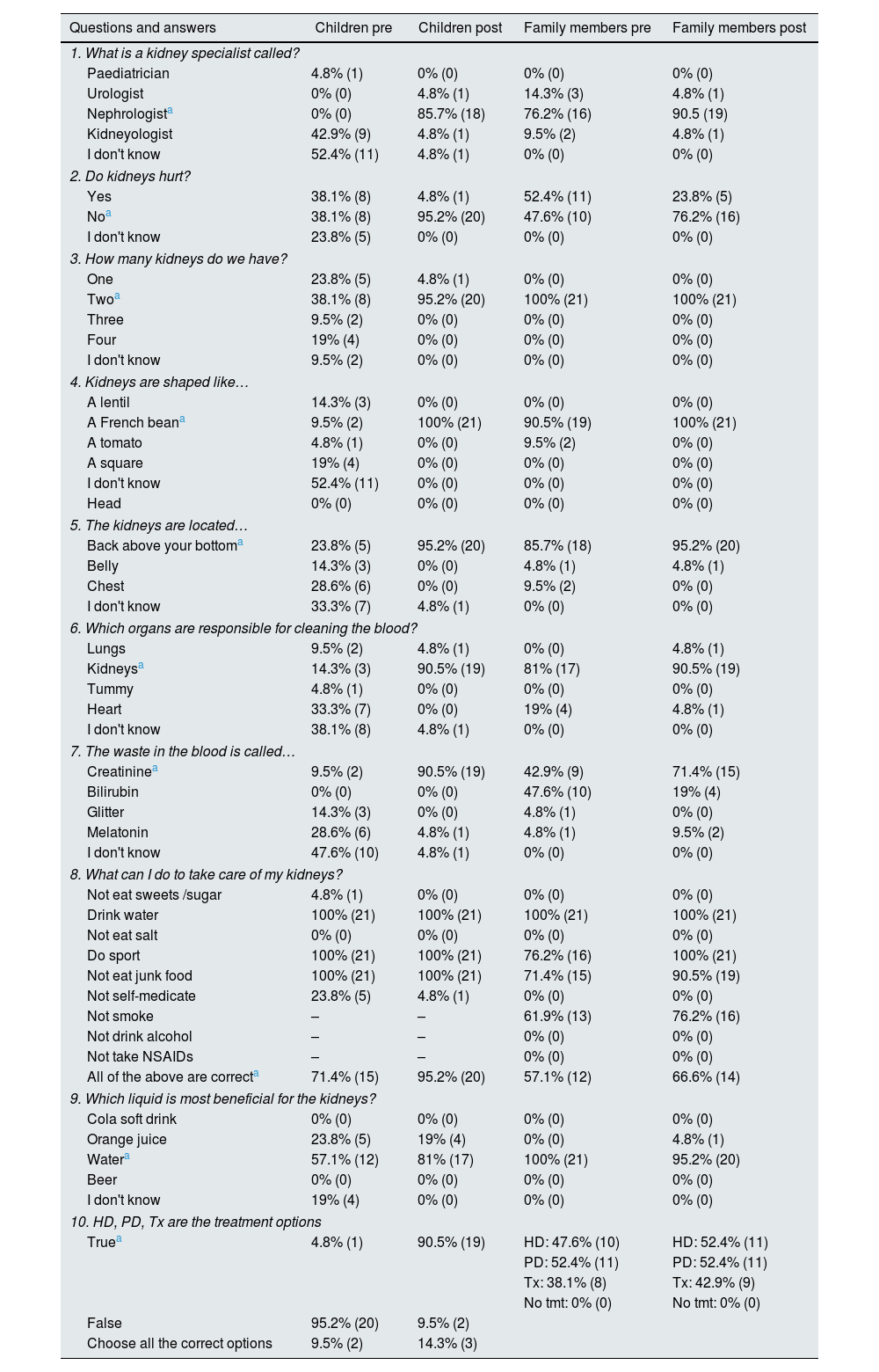Chronic kidney disease (CKD) is a silent epidemic with a concerning economic and psychosocial impact on Public Health.1 Despite this, there is a lack of awareness among the general population regarding the implications and scope of this condition,2 which represents an obstacle to early detection and treatment. To improve kidney health, it is essential to understand this disease and how to prevent it.
In this context, schools play a vital role in educating children on scientific-health issues, as recognised by the World Health Organization in various programmes.3 Nonetheless, children and young people are undervalued in national health plans on CKD.4 They are often rendered invisible as health promoters, and the reality is that they play an essential role in literacy and the dissemination of knowledge in their family and social environment.
Given this perspective, and considering the paucity of studies in the scientific literature on the impact of kidney health literacy in schools, this preliminary research raises a question: can children act as drivers of health education in their immediate environment and contribute to the prevention of CKD?
In order to shed light on this issue, the impact of a talk-workshop on CKD with 21 pupils from the 3rd year of Early Childhood Education (age 5 years), from the Arco Iris Nursery and Primary School (Aguadulce, Almería), and on their families, was analysed. The activity consisted of reading the illustrated children's book Renata, my nephrologist,5 written and devised by the Renal Foundation, as well as conducting a series of associated workshops.6 Knowledge before and after the initiative was assessed using an ad hoc questionnaire (pre- and post-intervention) adapted for children and adults (who were not present during the activity).
The initial hypothesis was that the talk-workshop would improve pupils' knowledge about CKD, and that they would pass on what they had learned to their families. The average grade of the children improved significantly after the intervention (from 2.43 [SD 2.18] to 9.19 [SD 1.17] in the final evaluation [p < 0.001]), as did the grade of their relatives, although to a more moderate extent (from 6.81 [SD 1.29] at baseline to 8.10 [SD 1.48] after the initiative [p = 0.024]).
These data show that, after the activity with the pupils, their families' level of knowledge increased. Other international research projects have also shown that, after lessons at school, children discuss health issues at home, increasing their parents' knowledge7 and encouraging lifestyle changes in their families.8 Kidney health education programmes in schools (through teacher training, school support nursing and investment in resources by institutions) have a direct impact on literacy throughout society (Fig. 1).9
One worrying finding, however, is the family members' relative lack of background knowledge on kidney-related issues and kidney health. A large proportion of adults did not know many of the answers: a quarter had never heard of the speciality of Nephrology, approximately half thought that kidneys hurt when affected by CKD or did not know what the marker of kidney function is (creatinine), and less than 10% were familiar with the available treatment options (Table 1). These data show that many adults would be unable to interpret their tests or do not even know which specialist they should see, directly resulting in delayed CKD diagnosis.
Results for each item pre- and post-intervention for children and family members.
| Questions and answers | Children pre | Children post | Family members pre | Family members post |
|---|---|---|---|---|
| 1. What is a kidney specialist called? | ||||
| Paediatrician | 4.8% (1) | 0% (0) | 0% (0) | 0% (0) |
| Urologist | 0% (0) | 4.8% (1) | 14.3% (3) | 4.8% (1) |
| Nephrologista | 0% (0) | 85.7% (18) | 76.2% (16) | 90.5 (19) |
| Kidneyologist | 42.9% (9) | 4.8% (1) | 9.5% (2) | 4.8% (1) |
| I don't know | 52.4% (11) | 4.8% (1) | 0% (0) | 0% (0) |
| 2. Do kidneys hurt? | ||||
| Yes | 38.1% (8) | 4.8% (1) | 52.4% (11) | 23.8% (5) |
| Noa | 38.1% (8) | 95.2% (20) | 47.6% (10) | 76.2% (16) |
| I don't know | 23.8% (5) | 0% (0) | 0% (0) | 0% (0) |
| 3. How many kidneys do we have? | ||||
| One | 23.8% (5) | 4.8% (1) | 0% (0) | 0% (0) |
| Twoa | 38.1% (8) | 95.2% (20) | 100% (21) | 100% (21) |
| Three | 9.5% (2) | 0% (0) | 0% (0) | 0% (0) |
| Four | 19% (4) | 0% (0) | 0% (0) | 0% (0) |
| I don't know | 9.5% (2) | 0% (0) | 0% (0) | 0% (0) |
| 4. Kidneys are shaped like… | ||||
| A lentil | 14.3% (3) | 0% (0) | 0% (0) | 0% (0) |
| A French beana | 9.5% (2) | 100% (21) | 90.5% (19) | 100% (21) |
| A tomato | 4.8% (1) | 0% (0) | 9.5% (2) | 0% (0) |
| A square | 19% (4) | 0% (0) | 0% (0) | 0% (0) |
| I don't know | 52.4% (11) | 0% (0) | 0% (0) | 0% (0) |
| Head | 0% (0) | 0% (0) | 0% (0) | 0% (0) |
| 5. The kidneys are located… | ||||
| Back above your bottoma | 23.8% (5) | 95.2% (20) | 85.7% (18) | 95.2% (20) |
| Belly | 14.3% (3) | 0% (0) | 4.8% (1) | 4.8% (1) |
| Chest | 28.6% (6) | 0% (0) | 9.5% (2) | 0% (0) |
| I don't know | 33.3% (7) | 4.8% (1) | 0% (0) | 0% (0) |
| 6. Which organs are responsible for cleaning the blood? | ||||
| Lungs | 9.5% (2) | 4.8% (1) | 0% (0) | 4.8% (1) |
| Kidneysa | 14.3% (3) | 90.5% (19) | 81% (17) | 90.5% (19) |
| Tummy | 4.8% (1) | 0% (0) | 0% (0) | 0% (0) |
| Heart | 33.3% (7) | 0% (0) | 19% (4) | 4.8% (1) |
| I don't know | 38.1% (8) | 4.8% (1) | 0% (0) | 0% (0) |
| 7. The waste in the blood is called… | ||||
| Creatininea | 9.5% (2) | 90.5% (19) | 42.9% (9) | 71.4% (15) |
| Bilirubin | 0% (0) | 0% (0) | 47.6% (10) | 19% (4) |
| Glitter | 14.3% (3) | 0% (0) | 4.8% (1) | 0% (0) |
| Melatonin | 28.6% (6) | 4.8% (1) | 4.8% (1) | 9.5% (2) |
| I don't know | 47.6% (10) | 4.8% (1) | 0% (0) | 0% (0) |
| 8. What can I do to take care of my kidneys? | ||||
| Not eat sweets /sugar | 4.8% (1) | 0% (0) | 0% (0) | 0% (0) |
| Drink water | 100% (21) | 100% (21) | 100% (21) | 100% (21) |
| Not eat salt | 0% (0) | 0% (0) | 0% (0) | 0% (0) |
| Do sport | 100% (21) | 100% (21) | 76.2% (16) | 100% (21) |
| Not eat junk food | 100% (21) | 100% (21) | 71.4% (15) | 90.5% (19) |
| Not self-medicate | 23.8% (5) | 4.8% (1) | 0% (0) | 0% (0) |
| Not smoke | – | – | 61.9% (13) | 76.2% (16) |
| Not drink alcohol | – | – | 0% (0) | 0% (0) |
| Not take NSAIDs | – | – | 0% (0) | 0% (0) |
| All of the above are correcta | 71.4% (15) | 95.2% (20) | 57.1% (12) | 66.6% (14) |
| 9. Which liquid is most beneficial for the kidneys? | ||||
| Cola soft drink | 0% (0) | 0% (0) | 0% (0) | 0% (0) |
| Orange juice | 23.8% (5) | 19% (4) | 0% (0) | 4.8% (1) |
| Watera | 57.1% (12) | 81% (17) | 100% (21) | 95.2% (20) |
| Beer | 0% (0) | 0% (0) | 0% (0) | 0% (0) |
| I don't know | 19% (4) | 0% (0) | 0% (0) | 0% (0) |
| 10. HD, PD, Tx are the treatment options | ||||
| Truea | 4.8% (1) | 90.5% (19) | HD: 47.6% (10) | HD: 52.4% (11) |
| PD: 52.4% (11) | PD: 52.4% (11) | |||
| Tx: 38.1% (8) | Tx: 42.9% (9) | |||
| No tmt: 0% (0) | No tmt: 0% (0) | |||
| False | 95.2% (20) | 9.5% (2) | ||
| Choose all the correct options | 9.5% (2) | 14.3% (3) | ||
McNemar test. p < 0.05; p > 0.05.
HD: haemodialysis; PD: peritoneal dialysis; tmt: treatment; Tx: transplant.
Compared to other diseases, such as cardiovascular disorders, hypertension, diabetes or cancer, CKD urgently requires more awareness raising and campaigns. Lack of knowledge among the population about CKD and its risk factors favours the development and progression of the disease, is associated with a worse diagnosis and prognosis, and with worse outcomes in renal replacement therapy.10
Ultimately, healthcare professionals are responsible for identifying patients with low health literacy and, in collaboration with teachers, helping to promote the health of the population. New strategic plans that include CKD as a priority disease and that also place children at the centre of their care are urgently needed. The results of this research (to the best of our knowledge, the first to be conducted in Spain on the potential of children as agents of awareness raising and prevention of kidney disease) open up new avenues for nephrology research and initiatives.
The authors would like to thank the management of the Arco Iris Nursery and Primary School and the teacher of the pupils of the 3rd year of the second cycle, Adriana de la Peña Jiménez-Valladolid, for their faith in the project and their invaluable support. We would also like to thank M. del Mar Ojeda Ramírez, Early Childhood Education teacher and educational psychologist, for her help and advice in adapting the questionnaire to the children's level of knowledge, as well as in the design of teaching resources. Finally, we wish to thank all the pupils and families who participated in the study.








